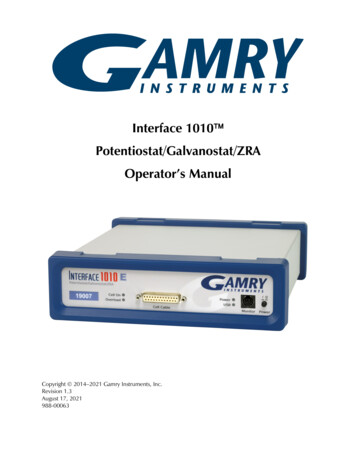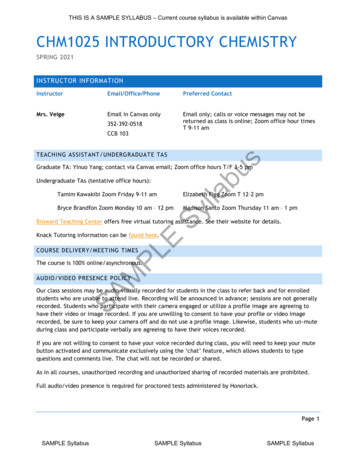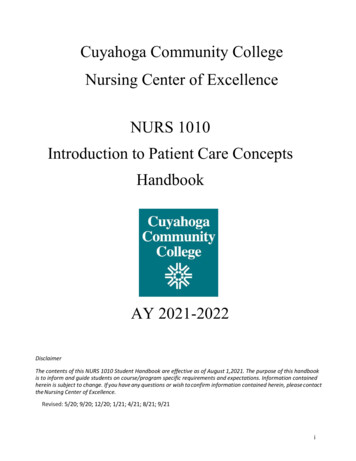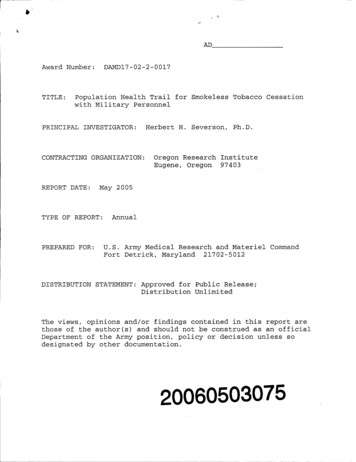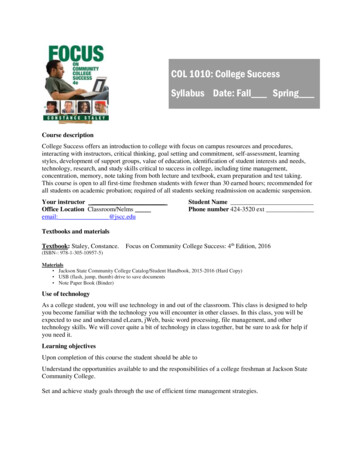
Transcription
COL 1010: College SuccessSyllabus Date: Fall SpringCourse descriptionCollege Success offers an introduction to college with focus on campus resources and procedures,interacting with instructors, critical thinking, goal setting and commitment, self-assessment, learningstyles, development of support groups, value of education, identification of student interests and needs,technology, research, and study skills critical to success in college, including time management,concentration, memory, note taking from both lecture and textbook, exam preparation and test taking.This course is open to all first-time freshmen students with fewer than 30 earned hours; recommended forall students on academic probation; required of all students seeking readmission on academic suspension.Your instructorOffice Location Classroom/Nelmsemail: @jscc.eduStudent NamePhone number 424-3520 extTextbooks and materialsTextbook: Staley, Constance.Focus on Community College Success: 4th Edition, 2016(ISBN-: 978-1-305-10957-5)Materials Jackson State Community College Catalog/Student Handbook, 2015-2016 (Hard Copy) USB (flash, jump, thumb) drive to save documents Note Paper Book (Binder)Use of technologyAs a college student, you will use technology in and out of the classroom. This class is designed to helpyou become familiar with the technology you will encounter in other classes. In this class, you will beexpected to use and understand eLearn, jWeb, basic word processing, file management, and othertechnology skills. We will cover quite a bit of technology in class together, but be sure to ask for help ifyou need it.Learning objectivesUpon completion of this course the student should be able toUnderstand the opportunities available to and the responsibilities of a college freshman at Jackson StateCommunity College.Set and achieve study goals through the use of efficient time management strategies.
Learning objectivesCivic Engagement (Constitution Day, Voter Registration, Mosque Visitation, etc.)Grade Point Average (GPA) How to a calculate GPAIntegrated co-requisite applications (materials per content course: textbook, etc.)Select and/or establish an environment conducive to study.Understand and recall major ideas from textbook readings and lectures/T-notes.Create an organized set of notes from textbook readings and lectures.Use appropriate test-taking strategies for objective and subjective tests in a variety of formats, includingessay, short-answer, and recall/multiple-choice/Testing Seminar.Identify and formulate problems as well as propose and evaluate their solutions.Draw reasonable conclusions from written or graphic sources and defend those conclusions rationally.Use both inductive and deductive reasoning.Distinguish between fact and opinion.Effectively use the learning support and research resources available in the Library Building/Library visit.Locate, evaluate, and use research appropriate at the college level online and though Library databases.Use basic technology including word processing, email, online course environments, and JSCC onlineenvironments/PowerPoint.Understand how to contact and interact with instructors in a professional manner.Explore future and present career goals/Resume.Establish realistic and rewarding personal, career, and life goals.Plan a program of study, register for appropriate classes, and make any necessary enrollment adjustmentsafter registration/Registration for next term.Graded work and grading policyThe final course grade will be determined by the combined scores on all scored assignments. Grades willbe determined on a ten-percent scale:1000-900 points (100%-90%) A;899-800 points (89%-80%) B;799-700 points (79%-70%) C699-600 points (69%-60%) D599-500 points (59%-50%) FGraded work includes homework, group work,participation/engagement, exams, quizzes, activities, and essays/journals.Please keep all copies of your graded work for the entire semester. If you are asked to submit graded workbut no longer have it, your grade on the accompanying assignment will be reduced.Grading for this course will consist of the following components:Homework Assignments (10)10pts. ea.100 pts.Journaling/Written/Typed/or Online Discussion Questions (10) 20pts. ea.200 pts.In-class participation100 pts. (note to instructors: online sections adjust points todiscussion questions to 30 points each.Exams (4)25pts. ea.Service Learning/Essays (2) not required 100pts. ea.100 pts.Power Point Group Presentation 200pts.Miscellaneous Activities (campus , community, other class assignments)Total:400pts1,000 pointsCollege Success
Topic 1—Research a job/career that you could obtain relative to your major. Include salary information,job growth predictions, etc. in your essay. Journals replace this assignmentTopic 2—Research a famous person who has been successful in their career and whom share the samefield of study as you. For example, you are majoring in Computer Information Systems and choose to doyour report on Bill Gates. Include biographical information, as well as reasons why you chose to researchthis person. (Applicable to online course only) Journals replace this assignmentAttendance, tardiness, and early departures: To be set by instructorParticipation/Engagement:To be set by instructorAcademic integrity policyAt Jackson State, academic integrity is expected of all students. As a currently enrolled student, you haveagreed to abide by the institution’s honor code, which includes the understanding that you will personallyand autonomously complete all graded work. Cheating will not be tolerated in any form, includingplagiarism of written work. The penalty for academic dishonesty in this class ranges from failure of theassignment to failure of the course. All instances of academic dishonesty will be reported to Jackson Stateadministration.If you ever have any questions about what constitutes academic dishonesty — cheating or plagiarism —see your instructor for answers before you turn in the assignment.ResourcesJackson State offers many free resources to enhance students’ success at college. Make use of as many aspossible while you are here.Disabled Student Services offers support to students with documented disabilities of any kind. If you haveany questions about disabled student services at Jackson State, visit the Counseling Office in the StudentUnion.Counseling is available to students who experience physical or mental stress or impairment during theirtime at Jackson State.The Library provides excellent support for all of your research needs. Ask the librarians for help withyour research projects, and you will find far more useful information than you would otherwise.The Academic Assistance Center offers free tutoring in most courses at Jackson State. If you have troublewith the material in your courses, contact the AAC, located on the Library Building’s second floor, at731.425.2614 to be paired with a tutor.The Writing Center offers free, one-on-one tutoring in any stage or type of writing in any class offered atJackson State. Make an appointment by calling 731.425.8848, or by stopping in the Writing Center,located in the Library Building.Jackson State Community College (JSCC) is a Tobacco Free Campus (No smoking on campus)College Success
JACKSON STATE COMMUNITY COLLEGE SYLLABUSREAD 0010 – Laboratory for college SuccessINSTRUCTOR:OFFICE: C 115KPHONE: 424-3520, Ext. 50391E-MAIL: @jscc.eduINSTITUTIONAL CREDIT: 3 hoursCONTACT HOURS: 3 hours per weekCOURSE DESCRIPTION: READ 0010, Lab for COL 1010, 3 cr.Co-requisite reading lab for students with reading ACT scores below 19 who are required to enrollin COL 1010 to satisfy the reading competencies. Completion will satisfy Tennessee Board ofRegents learning support reading competencies. This course does not meet general educationrequirements for graduation or elective credits for graduation.READ 0010 is a modularized course designed to improve the student’s reading competenciesto meet TBR Reading Competencies I and II. This course does not meet requirements forgraduation nor does it count toward elective credits for graduation.PLACEMENT: Placement is determined by ACT or COMPASS scoresREQUIRED MATERIALS:“Voices and Values”Goldstein and Langan ISBN 978-59194-443-0Ear buds to be brought to every class meetingThree pkgs. of 3x5 index cards (inexpensive ones are best!)Upon completion of this course, the student should be able to master the following skills on the12th grade reading level.1.2.3.4.5.6.Identify and comprehend the main and supporting ideas.Write a paraphrased summary.Recognize the author's purpose, organization, point of view, and tone.Make accurate inferences.Separate the reader's opinions from those of the author.Identify and effectively use the table of contents, preface, introduction, title, and subtitles,index, glossary, appendix, and bibliography of a book or other reference.Course Requirements:To earn a passing grade in this course, students must successfully: Read the Contents, Alternate Table of Contents, Becoming a Better Reader and annotate39 articles in “Voices and Values” and test on each article Complete any other work assigned by instructor Meet the attendance requirementsAll assignments are to be completed by the module due date. Failure to complete work bythe module due date will seriously jeopardize passing the course. Instructors will notattempt to accommodate students who try to complete significant amounts of work in thelast class meetings. Students may choose to work ahead of the scheduled dates. When allassignments are satisfactorily completed, the student may exit the course.
GradesSatisfactoryUnsatisfactoryADA POLICYStudents with documented disabilities should make the instructor aware of any conditions thatrequire special accommodations.Classroom BehaviorStudents are expected to be respectful of the instructor and fellow students. Talking is notallowed during class time as it disturbs other students who are trying to work. Students areto work on assignments pertaining only to reading class while they are in the Reading Lab.Anyone who is disrespectful or disruptive in any way will be asked to leave the class.Recreational use of the Internet is strictly forbidden and may result in dismissal from class.All electronic devices, including cell phones, must be kept out of sight in the reading lab.Phones that are not kept out of sight may be confiscated.AttendanceRoll will be taken each class meeting.It is the responsibility of the student to inform the instructor if he/she is tardy; failure to do sowill result in being counted absent.Class attendance will be considered in your evaluation for the course. Excessive absences willpenalize your grade. Missing the equivalent of three weeks of classes will result in failure ofthe course. Please discuss extenuating circumstances with your instructor immediately.WebsitesLAST DAY TO DROP/WITHDRAW FROM THE course/college:Please refer to the JSCC Student Handbook for the college policy on academic honesty.READ 0010
“There is only one success—to be able to spend your life in your own way.”--Christopher MorelyCOL 1030: College to Career NavigationJackson State Community College(3 Credit Hours)Instructor:Email:Office:Phone:Office Hours:Course Description:The purpose of this course is to help you navigate college with your career and life goals in mind. Thecourse is designed to develop your understanding of your personal aptitudes, interests and values andto provide effective strategies for the challenges you may face in making successful college and careerdecisions. The work of the course involves self-assessment exercises, teamwork, case studies andinformation on careers related to specific academic focus areas. The aim of the work is to provide thebasis for an informed choice of an academic focus area and related career and life decisions.Learning Objectives (What does “learning objective” mean? What key words stand out to you?):1.Use critical thinking to identify personal goals for college and career.2.Understand how to get motivated to learn.3.Recognize and respond effectively to areas of personal responsibility.4.Recognize internal and external obstacles.5.Identify strategies for effective self-management including time-management.6.Develop mutual cooperation and effective communication skills includingactive listening.7.Identify strategies for success.8.Identify the steps needed to achieve success in a field of interest.Course Supplies (required):1. On Course: Strategies for Creating Success in College and in Life, 8th edition, by Skip Downing ISBN97813053974772. Composition notebook for journaling—dedicated only to this class.Student DisabilitiesAny student with a documented disability should follow the steps outlined on p. 29 of the JSCC Catalog(see www.jscc.edu). Reasonable accommodations will be made for any student with a documenteddisability who follows the procedure set forth on p. 29, including information the Counseling Center atJSCC and this instructor early in the semester, hopefully by the end of the first week of class. For moreinformation, contact: the Counseling and Career Center in the Student Union. The phone is 425-2616and the e-mail is lnickell@jscc.edu.
Method (or what to expect):On the first day of classes, you will be randomly sorted into “success teams.” You should think of themembers of your success team as your closest neighbors in our classroom community. Exchange contactinformation, get to know each other. You will have some assignments together throughout the semesterand hopefully serve as a support for each other.Reading the book is important in this class. It is filled with great ideas and strategies that will help you inalmost every part of your life. Plus, this is not your typical lecture-based class. We talk aboutexperiences and concepts in class. Reading the book and knowing those concepts is only going to makethings easier for you.Another important part of the class is journaling. As a famous author once said, “I write because I don'tknow what I think until I read what I say.” (Do you know what author said this? Can you find out?)Journaling is exactly that—it helps you get to know yourself by helping you take a moment to organizeyour thoughts and put them on paper. I know you may not believe this, but many students who take thiscourse, end up continuing to keep journals because they find it so helpful. That could be you by the endof the semester.In class, we do a lot of activities and group work. Now, it isn’t one big group project, so don’t fret. Youand your classmates will do many activities together and in the process you will learn about yourself andcome to know your classmates really well. You might even find you have a lot in common and maybethings you thought were “just you” are things shared by a lot of people. How great would that be?We also have some quizzes and a couple of online discussions in this course. After all, just as we are notall the same in opinions or hobbies, we don’t all learn in the same way. We need variety in a class sothat everyone has a chance to do something they’re really good at.We will spend some time looking at careers and talking with advisors. Maybe you think you alreadyknow what you want to do, so what’s the point in this? Well, it’s simple: You don’t know what you don’tknow. Maybe you find something you didn’t know existed and you think, YES! This is the thing for me!The last thing you’ll do in this class is write an essay about your journey as a student in the course. You’llwrite about those concepts and strategies and how they apply to your specific situation. I know whatyou’re thinking, “how long does it have to be?” That is always the first question, but should it be? Thinkabout it this way: This is your chance to write about your life and how what you learned in this class hasguided you and helped in a variety of ways. How often do you get that chance? So, a heads up—payattention to what moves you, pay attention to your journey, pay attention to your life. This will not onlyhelp you know what to write, but will undoubtedly help you along the way in your future.By the end of the course, you’ll know a few people, have some new ideas about what your career goalsmight be, and have several new strategies to help you through tough decisions.GradesPointsA 270–300B 240–269C 210–239D 180–209F 208 or belowTotal Points 300
1.2.3.4.5.6.Quizzes: 7 @ 5 points 35 pointsSuccess Journals/Other Assignments: 30 @ 5 points 150 pointsOnline discussion: 3 @ 5 points 15 pointsIndividual Advising Meeting: 1 @ 10 pointsCareer Lab Worksheet Activities: 2 @ 15 points 30 pointsFinal Essay @ 60 pointsClass attendance:Coming to class is really important. I know professors say that all the time, but it is true, especially in thisclass. Remember, we will do a lot of exercises in class. If you miss it, you miss it. It isn’t like an examwhere you can make it up later. It is an experience, and experiences can’t be made up. So, you can keepall the points you earned by attending class. Up to about 3 hours (that’s one week of class) will beexcused. Beyond that, you’ll start losing points from your assignments. Here is a chart showing thosepoint deductions:T/R or M/W 15 week course: 5 points per absence15 week night class (one night per week): 10 points per absence7 week class (2 sessions per week): 10 points per absence7 week class (3 sessions per week): 6 points per absence5 week class (4 sessions per week): 7 points per absenceSo, class attendance is important. Imagine if you attended and participated in every class. What mightyou gain?Assignments:Quizzes (35 Possible Points)This course can show you ways to be successful in college and in life. One of the best ways to besuccessful is to be prepared. In this course, one way to be prepared is to read the assigned chapters.Having read the chapter, you’ll have no problem with a quiz, right? Great success is created one smallstep at a time. Each time that you earn your quiz points you take an important step toward your successin this course . . . and in life! Quizzes, much like life experiences, may not be made up.Success Journals, Online Discussions and Other Activities (205 Possible Points)Did you find out who that quote about writing was by? Here’s another: “Writing, to me, is simplythinking through my fingers.” You will have numerous opportunities to think through your fingers in thiscourse. Your Success Journals give you the opportunity to explore your thoughts and feelings as youlearn about and experiment with the success strategies presented in the On Course textbook. By payingattention to these strategies in your journals, you will discover which ones are most meaningful to you.Please don’t hold back in your journal. Although I will be collecting your journals and looking throughthem, you should write your journal for yourself, not for me. Do also know that some less personaljournal entries may occasionally be shared in class. If you are uncomfortable sharing your journals, that’scool—you always have a choice.
It is important that you bring your textbook and journal to every class. Note: Because some of us aredigital and others are analog we do have some options in journal writing. 1.) Composition book (You canwrite the first draft of journal entries on loose sheets of paper, but all journal entries must be written inthe composition notebook when it is handed in for evaluation). 2) Computer based (If you choose towrite your journals on a computer, you will need to print hard copies of all entries and bring them toclass neatly organized in a three-ring binder). Either way, at the end of this semester, you will have yourentire journal to keep for years to come (and you may just continue to write in it as many others havedone. It might become one of your most valued possessions.)Journal Evaluations: Journals are due once a week. I will not read every journal entry you write. I willlook through your journal entries to see that you have completed the assignment, that you spent sometime on it and thought deeply about it. I do read occasional journal entries to get a sense of yourstruggles, goals, and accomplishments. If I have some ideas about you, I can be much more helpful toyou throughout the semester. If you want to know what I think about any specific journal entry, pleasewrite me a note in your journal so I will know to read that one more thoroughly.Journal Points: Each journal entry will be awarded up to 5 points. You can receive the maximum pointsif:1.The entry is complete (all steps in the directions have been responded to), and2.The entry is written with high standards (an obvious attempt has been made to Dive Deep).You are free to express yourself in your journals as creatively as you wish without worrying about formalwriting standards.You will also think through your fingers on three online discussion posts. There are a couple of reasonsfor this: First, it is important to know how to use eLearn because many of your professors utilize thisinteractive platform. Second, remember we all learn in different ways, this may be great for you! Pleasethink of this as an opportunity for sharing and learning. How you feel about something, the languageyou use makes a difference. For example, if you say, “I HAVE to do this assignment” it feels differentfrom saying “I CHOOSE” to do this assignment.” What is the difference in how each of those statementsmake you feel?Other activities: We will spend some time looking at career choices. Career lab dates will include anexploration of career choices, information about your chosen career(s), how to job search and interview,as well as some advising activities and campus exploration. Your fees for this course include the fee toattend the class interdependence activity at Jackson Escape Rooms. You will love this experience. Notonly will you learn some things about yourself (and your classmates) you will have fun!Final Essay (60 Possible Points)As your final project, you will choose one of the two following topics on which to write an original essay.Option 1: One Student’s StoryIn this essay, you will tell the story of how you used specific On Course strategies to overcome anobstacle to your success in college or in life. Each chapter of the textbook contains at least one of the“One Student’s Story” essays. We have read some of them over the course of the semester, but pleaseread one or two before beginning your story. Use these as a model for what you write. If your essay isinsightful and well done, your instructor may submit it to the On Course Essay Contest (with yourpermission). Winning entries will be published in the next edition of the On Course text and will inspire
future students. Winning entries will also be awarded a 100 prize. Full directions for writing this essaycan be found at contest.An “A” paper will . . .1.Tell the story of a specific obstacle(s) you faced.2.Tell the story of a specific On Course strategy you used to overcome that specific obstacle.3.Tell the story of the outcome of using the specific On Course strategy to overcome the specificobstacle you faced.4.Tell the story of a commitment to excellence in preparation, including professional appearanceand a command of Standard English. (This should be more formally written than your journals).Option 2: Personal Philosophy of Success EssayIn this essay, you will present your own Personal Philosophy of Success, identifying the On Coursesuccess strategies that you will use in your life for years to come. This essay is your opportunity to writethe script that will keep you “on course” to a rich, personally fulfilling life!An “A” paper will . . .1.Offer your personal definition of success.2.Demonstrate your careful consideration of three or more of the On Course success strategiesthat you will use to achieve success.3.Contain extensive and specific support (examples, experiences, evidence, and/or explanation)for each strategy. (Details count!)4.Show a commitment to excellence in preparation, including professional appearance and acommand of Standard English. (This should be more formally written than your journals).Course Guidelines (Rules) for SuccessWe want the best sort of environment in our classroom community. In order to create this communitywhich supports success for us all, we have three important guidelines, or rules. By choosing to followthese three rules, you are choosing to be successful not only in this course but in your life.1.Show up—to support my success, I choose to attend every scheduled class period in its entirety.2.Do the work—to support my success, I choose to do my very best work in preparing all of myassignments and hand them in on time. I am responsible for my learning and personal quiz answers,and I own my work so I do not engage in plagiarism (copying other’s work without using quotation marksand references to give credit to the true author).3.Participate actively—to support my success, I choose to stay focused and involved in every classsession, offering my best comments, questions, and answers when appropriate, and I will only use mycell phone or other electronic device before or after class, when my instructor requests, or when theclass is using computers together.What other guidelines should there be in this class?
JACKSON STATE COMMUNITY COLLEGE SYLLABUS READ 0010 - Laboratory for college Success INSTRUCTOR: _ OFFICE: C 115K INSTITUTIONAL CREDIT: 3 hours PHONE: 424-3520, Ext. 50391 CONTACT HOURS: 3 hours per week E-MAIL: _@jscc.edu COURSE DESCRIPTION: READ 0010, Lab for COL 1010, 3 cr.



